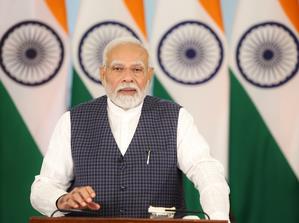
Unwavering In Commitment To Popularising Regional Languages, PM Modi On Classical Language List Expansion
The Union Cabinet, chaired by PM Modi, has approved conferring the status of Classical Language to Marathi, Pali, Prakrit, Assamese, and Bengali languages.
Taking to X, PM Modi said: "Our Government cherishes and celebrates India's rich history and culture. We have also been unwavering in our commitment to popularising regional languages. I am extremely glad the Cabinet has decided that Assamese, Bengali, Marathi, Pali and Prakrit will be conferred the status of Classical Languages! Each of them are beautiful languages, highlighting our vibrant diversity."
The Prime Minister also made an exclusive mention of every single language that has been included in the Classical Language fold on Thursday.
About the Assamese language, spoken majorly and primarily in the northeastern state of Assam, PM Modi wrote on X: "I am immensely delighted that Assamese will now get the status of a Classical Language after this was approved by the Union Cabinet. Assamese culture has thrived for centuries, and it has given us a rich literary tradition. May this language continue to become even more popular in the times to come. My congratulations."
The Prime Minister also expressed happiness over the Bengali language being accorded the Classical Language status during the season of Durga Puja -- the most important religious event for Hindu Bengalis.
"I am very happy that the great Bengali language has been conferred the status of a Classical Language, especially during the auspicious time of Durga Puja. Bengali literature has inspired countless people for years. I congratulate all the Bengali speakers all over the world on this," PM Modi wrote on X.
A significant decision taken on Thursday was also to add Marathi to the Classical Language list. The language is spoken across Maharashtra -- the state where Assembly elections are forthcoming, and the Central government's decision is expected to bring cheers to the people.
Describing the Marathi language as the "pride of India", PM Modi wrote on X: "Marathi is India's pride. Congratulations on this phenomenal language being accorded the status of a Classical Language. This honour acknowledges the rich cultural contribution of Marathi to our nation's history. Marathi has always been a cornerstone of Indian heritage. I am sure with the status of a Classical Language, many more people will be motivated to learn it."
In another post, PM Modi wrote: "Pali and Prakrit are at the root of India's culture. These are languages of spirituality, wisdom and philosophy. They are also known for their literary traditions. Their recognition as Classical Languages honours their timeless influence on Indian thought, culture and history. I am confident that after the Cabinet decision on recognising them as Classical Languages, more people will be motivated to learn about them. This is indeed a joyous moment!"
The languages added to the Classical Language list on Thursday join six others -- Tamil, Sanskrit, Telugu, Kannada, Malayalam, and Odia.
The Central government decided to create a new category of languages as "Classical Languages" on October 12, 2004, declaring Tamil as a Classical Language and setting the following as criteria for the status of Classical Language: High Antiquity of its early texts/recorded history over a thousand years. Secondly, a body of ancient literature/ texts, which is considered a valuable heritage by generations of speakers. Third, the literary tradition must be original and not borrowed from another speech community.
A Linguistic Experts Committee was constituted by the Ministry of Culture under the Sahitya Akademi in November 2004 to examine the proposed languages for the status of Classical Language.
The criteria were revised in November 2005 as follows.
First, the high antiquity of its early texts/recorded history over a period of 1,500-2,000 years.
Second, a body of ancient literature/texts, which is considered a valuable heritage by generations of speakers.
Third, the literary tradition is original and not borrowed from another speech community.
Fourth, the classical language and literature being distinct from modern, there may also be a discontinuity between the classical language and its later forms or its offshoots.

Legal Disclaimer:
MENAFN provides the
information “as is” without warranty of any kind. We do not accept
any responsibility or liability for the accuracy, content, images,
videos, licenses, completeness, legality, or reliability of the information
contained in this article. If you have any complaints or copyright
issues related to this article, kindly contact the provider above.

















Comments
No comment